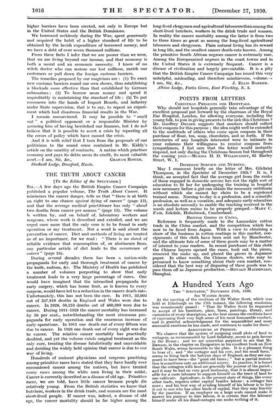POINTS FROM LETTERS
CHRISTMAS PRESENTS FOR HOSPITALS.
Why should not hospitals generally take advantage of the excellent proposal put forward by the chairman of the Royal Ear Hospital, London, for allowing everyone, including the young folk, to join in giving presents to the sick this Christmas ? Mr. Geoffrey Duveen suggests that smokers should collect their coupons for this purpose ; the idea might well be extended to the multitude of others who come upon coupons in their purchase of flour, tea, soap, chocolates, and so forth. If the secretaries of any hospitals interested were to intimate in your columns their willingness to receive coupons from sympathizers, I feel sure that the latter would instantly respond, not only during the Christmas Season but throughout the coming year.—MURIEL H. D. WILLOUGHBY, 95 Harley Street, W. 1.
DOMESTIC SERVICE AND NURSING.
May I comment briefly on the letter of Mrs. Gilchrist Thompson, in the Spectator of December 13th Y It is, I think, an accepted fact that the average girl from the ranks of those engaged in domestic service has not the right sort of education to fit her for undergoing the training in hospital now necessary before a girl can obtain the necessary certificate without which she cannot lay claim to be a registered trained nurse. Nursing to-day is a profession, and a scientific profession, as well as a vocation, and adequate early education is an absolute necessity to enable the teaching received in the wards and lecture rooms to be properly grasped.—MARY C. FAIR, Eskdale, Ilolmbrook, Cumberland.
BRITISH GOODS IN CHINA.
Reference is frequently made to the Lancashire cotton trade in the China market, and the competition which has now to be faced from Japan. With a view to obtaining a share of the business in cotton coatings in this market, con- signments of this cloth have been sent out by Manchester, and the ultimate fate of some of these goods may be a matter of interest to your readers. In recent purchases of this cloth the Chinese buyers opened the cases, took out the pieces, removed the make up, and placed the pieces in Japanese paper. In other words, the Chinese dealers, who may be presumed to know something about their own market, con- sidered that the best way of disposing of these goods was to


































 Previous page
Previous page